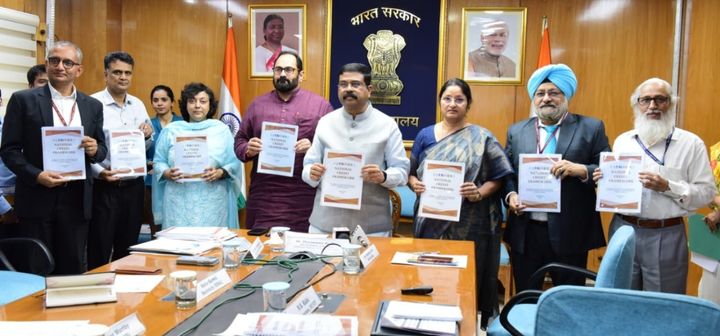On October 19, 2022, Union Minister of Education and Minister of Skill Development & Entrepreneurship Shri Dharmendra Pradhan launched the National Credit Framework (NCrF) draft for public consultation.
Under the dynamic leadership of Prime Minister Shri Narendra Modi, the Government of India has developed the National Credit Framework (NCrF) to facilitate the integration of academic and vocational domains in order to promote flexibility and mobility between the two. The NCrF would change the game by providing students with a wide range of opportunities for future development and integrating formal education with experiential learning and vocational education, mainstreaming skill development and vocational education. The NCrF will also provide an opportunity for students who have left the system of traditional education to re-join.
Here is the link to the document –https://www.education.gov.in/sites/upload_files/mhrd/files/National_Credit_Framework.pdf
Speaking on the occasion, Shri Dharmendra Pradhan stated that NEP 2020 also embraces the spirit of Jan-bhagidari, a key pillar of Prime Minister Narendra Modi’s governance. According to Shri Pradhan, “A comprehensive, next-generation instrument under NEP, is the National Credit Framework. To make “Jan-paramarsh” more active, we are dedicating NCrF. The National Credit Framework is an umbrella framework for skilling, re-skilling, up-skilling, accreditation, and evaluation that includes our people in educational and skilling institutions as well as the workforce.”
Shri Dharmendra Pradhan emphasized that the National Credit Framework will be the most important element under NEP for achieving these goals, including making India a $5 trillion economy, realizing the vision of a Vikasit Bharat in the next 25 years, and empowering 100% of our population. India is embracing technology at a never-before-seen rate. Reforms must be implemented to reward education, training, and experience. In the next two to three years, credits for knowledge acquisition, practical training, and beneficial social outcomes will be a significant step toward achieving 100% literacy.
Shri Dharmendra Pradhan made an appeal to all institutions, including schools, ITIs, AICTE-affiliated engineering colleges, centrally-funded HEIs, state universities, and regulatory authorities/bodies, requesting that they host the public consultation for the National Credit Framework on their websites in order to collect suggestions from citizens.

Under the direction of the Union Minister of Education and the Minister of Skill Development & Entrepreneurship, the Government established a committee comprising representatives from the UGC, AICTE, NCVET, NIOS, CBSE, NCERT, Department of School Education and Literacy and Department of Higher Education. By allowing students to select their own learning trajectories and programs, the inclusive umbrella framework seeks to make the alternatives for Multiple Entry-Multiple Exit accessible and adaptable across higher education, school education, and vocational education.
Proposed benefits for various stakeholders are as follows:
- Students: Through the provision of multiple entry and exit/work choices, NCrF will ensure flexibility in the length of study or courses. It will also clear the way for the crediting of all learning hours, including academic, vocational, and experiential learning. Additionally, it will provide for lifelong learning, or learning at any time and from any location.
- Institutions: With the help of NCrF, higher education institutions will work together to promote multidisciplinary learning and build students’ knowledge bases.
- Government: As part of the national vision to complement the demographic dividend and make India the Skill Capital of the World, NCrF is anticipated to help the government expand student enrollment.
- Industry: NCrF will enable students to get NSQF-approved foundational skills created by industry, making them more employable. The accessibility of micro-credentials will enable the incorporation of swift educational upgradation/upskilling.
The National Higher Education Qualification Framework (NHEQF), National Skills Qualification Framework (NSQF), and National School Education Qualification Framework (NSEQF) will all be included in NCrF, which will seamlessly incorporate the credits gained via school education, higher education, and vocational and skill education. Additionally, it enables Recognition of Prior Learning for the workforce that has acquired knowledge and skills informally through the traditional family inheritance, work experience, or other methods, as well as educational acceleration for students with gifted learning abilities.
The government is currently seeking feedback on the document, which can be sent to comments.ncrf@gmail.com.













